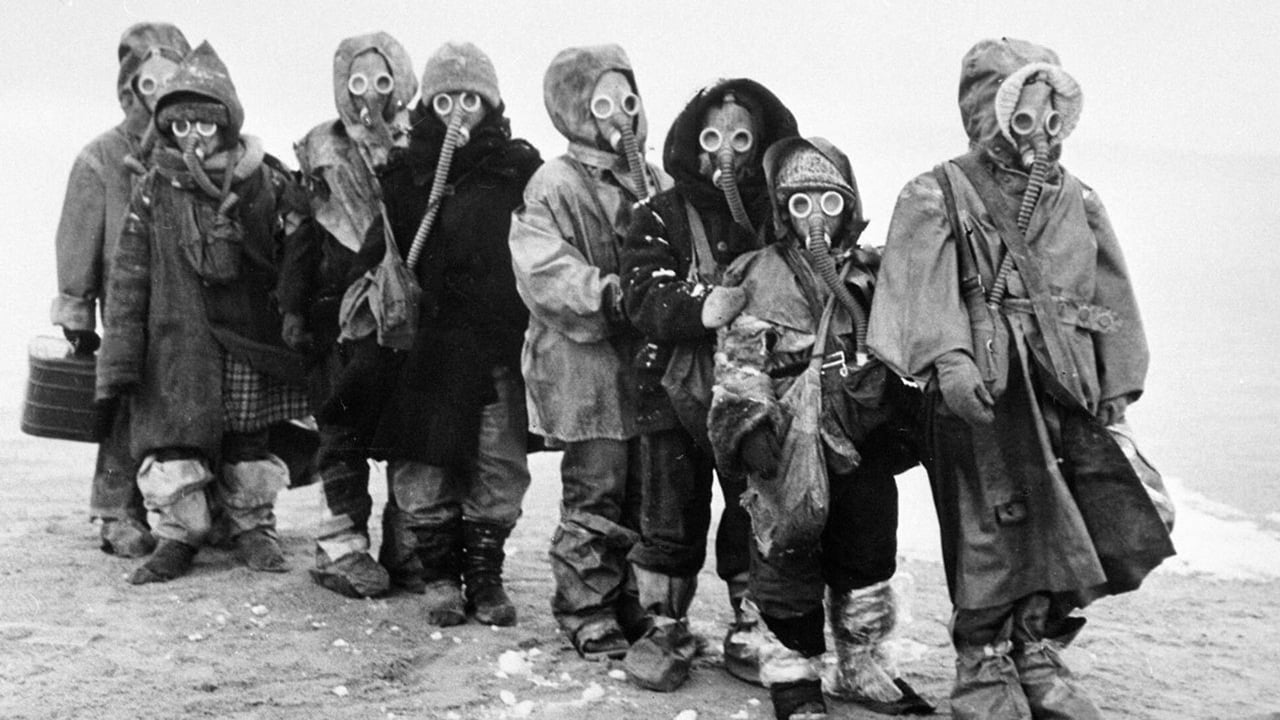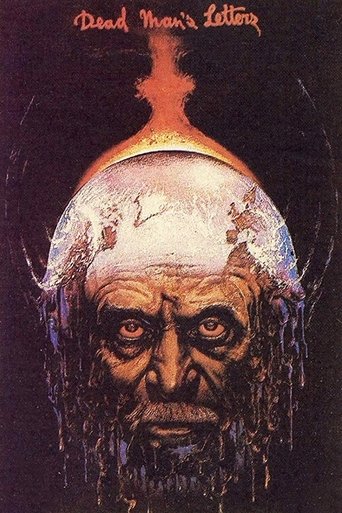

Unpopular opinion here but I'd like to think I have the basis for not liking or totally endorsing a film that could be a minor masterpiece of its era. "Letters from a Dead Man" could be interpreted as a response to the Chernobyl disaster, which took place a few months prior to the film's release. It could also be viewed as a response to the American/UK films about the frequent nuclear disaster and possible outcome of atomic bombs being dropped to a nation. Director Konstantin Lopushanskiy's first feature film obviously couldn't been an attack to the Soviets, their delay in spreading the news to the world and the way they dealt with the whole situation. Instead, he creates an apocalyptical world post-nuclear attack and how people survive in shelters and watered pits, trying to live with their best means they can while men, women and children keep on dying or having to face strict control by their own people - for instance, when the kids aren't allowed to enter a more safer place. Doctors keep on doing their job but it's all hopeless and no one can get out to the surface to see what's left after the blast, a world turned into a red dust, shattered and with some military forces telling us that people aren't allowed to go outside unless they have a pass. The film's point of view is from a scientist who reflects about not only his conflicts about a major part in creating the technology that caused the world's collapse and killed humanity, or reduced it to a future death sentence but he also ponders about (in letters) to his missing son - who is probably dead - and reminds of how their life used to be. Simple yet frank letters, yet they don't carry a higher sense of usefulness or, in this case, I deeply wanted a sort of sentimentality. To me, those letters were just a nostalgia that led to nowhere. I cared more for the character when he despertaly tried to get out of the pit and try to look for his son then just keep reminiscing about a life that is no longer there. The "Stalker" like visuals are cool but they're empty and void without the master's visual touch and sublime poetry. Konstantin makes a noble and valuable effort, a direct message to the Cold War world and its constant paranoia of bombing each other, with threats more real year went by but there's something missing: it's heartless, a snooze fest that fails to convince and to make us immersed in its calamity, the tragedy.1980's. In the wake of similar themed works such as "The Day After", "Special Report", "Testament", "When the Wind Blows" and "Threads" (yet to be seen by me, despite hearing about this one being the most horrific and realistic of them all the forementioned films), this artistic Soviet response was bureacratic just as was the treatment given to the Chernoby disaster - in fact, this film comes as reply to the events that shook Ukraine on the same year and that's why it's so important to at least get a glimpse to this film. But the director's presentation is faulty, beyond claustrophobic and hard to make your heart pulse. Sure, "The Day After" contained some of those depressive qualities and we wonder if the world was going to end or continue after a nuclear fallout. But I was confused with "Letters...": for what I gathered it was an human error that detonated a nuclear device that turned everything into dust and radiation was spread, and government still found ways to control people with curfews, passes and contained people underground - pretty much what USSR would actually do in such scenario. I disagree about the artist quote about art being useless/pointless - in the film context, it sort of works that way, but thinking a little deeper, art would probably be the only source of comfort for those in better shape/health. Imagination is what keeps us alive. Lopushanskiy had a few of it but not strong enough to create a shock to the senses, a catalyst for a deeper reflection despite the several thoughts shared by the characters about life and what's left of it after a disaster. I felt tired, depressed beyond my usual ways and didn't find any of those letters to Erick compelling, hearted or with some deep meaning.For the most of it, I think most people are seeing way too much about the film's message. It's there but it's too convoluted and almost inaccessible to most audiences. And I film like that should have been a little more down to audiences's earth. Like I said, it could be a minor masterpiece to make us reflect about mankind, the powers of be and how Chernobyl, though not being a nuclear attack of a nation against the other, made a whole shift in the gear when it comes to what nuclear energy was helpful in some ways but a disastrous and terrible thing for the environment and its people. In some brief moments, the story went quite well in dealing with such notion but it's just half way, doesn't go the extra mile needed for a higher discussion. 5/10
... View MoreThis is a post-apocalyptic movie where a group of Russian intellectuals, living in the airtight vaults of a museum, cling on in the twilight, going slowly mad according to their own pompous wonts.The movie is unremitting in its depressing depiction of a dead world. I was stuck between turning it off because it was almost sacrilegiously depressing, and remaining because of the sheer cataclysmic beauty. The images are mostly tinted yellow, although some shots are in tints of blue. There is no way this experience is going to allow you the respite of polychromatic images.There is a body of work that deals with the end of humankind in cinema, but any example I can think of seems completely notional in conception, this one actually felt like a recording of the end of days, as unflinchingly profane as a documentary of viaticums.I think it's also a tombstone for communism in Russia, suggested as a blind alley, and advocates a return to pre-revolutionary values regarding family and religion. But only in an intensely personal way, as if recounting the death of a close family member. It is more than a warning against nuclear war. In its parodying of ridiculous, pontificating, and obstructive authority, it's an emesis of authoritarian communism, a whole-hearted, wholesale rejection.As an endnote, there's a dolly-out in the first few minutes of the film that left my jaw on the floor, practically the best shot I've ever seen in cinema, my congratulations to Konstantin Lopushansky and his team.
... View MoreThis "Letters from a Dead Man" simply has got to be, hands down, one of the top three most depressing and pessimistic movies I ever encountered in my life. Of all Sci-Fi films dealing with remnants of life after the apocalypse – and believe me they are quite numerous – this Soviet Union produced sleeper upraises the most nightmarishly realistic and harrowing atmosphere ever. Even in your worst imaginable nightmares and premonitions, the post-nuclear existence probably still doesn't look as decayed and melancholic as illustrated here in this film. Survivors are forced to live underground, in the caves and catacombs of destroyed buildings, and have little else to do but watch each other fading away emotionally as well as physically. They can't go the surface without wearing special outfits and gas masks, but even then there's nothing else to do but stroll around between ruins, car wrecks and rotting corpses. With monotonous photography and the exclusive use of a yellow-tinted picture, director Konstantin Lopushansky (an acolyte of the Russian master Andrei Tarkovsky) fabricates the ideally lugubrious ambiance, and he can also rely on the devoted cast and bleakly void screenplay to assist.The story revolves on Rolan Bykov as a scientist – former Nobel Price winner, even – who entrenched himself underneath the remnants of a library building along with his wife and a handful of co-workers. The titular letters are addressed to his son whom the scientist hasn't seen or heard from since the catastrophe. The letters and above all the hope his son is still alive somewhere is what keeps the poor man going, but how long can you hold on to hope when you see everything and everyone around you dying? "Letters from a Dead Man" is a difficult but ultimately very rewarding cinematic experience to endure. Difficult, of course, because of the emotionally devastating imagery and atmosphere, and because there's actually very little substantial content. We literally stare at a handful of people languishing and eventually dying, with only a small hint at hope near the end. And rewarding because of the depiction of genuine humane sentiments and the thought-provoking messages. It's also highly remarkable how "Letters from a Dead Man" remains continuously vague regarding the cause of the apocalypse and eventually even searches the guilt in the own heart. In a time where movies released on the other side of the Iron Curtain (in Europe and particularly the USA) routinely blamed Russia for the potentially upcoming apocalypse, this tale suggests the root cause of the catastrophe lies in a human error during the launch of a space shuttle. The entire cast gives away tremendous performances. I don't know if these people are veteran actors and actresses in their home countries, but their grimaces and catatonic behavior suggest that they were selected especially for this type of discouraging parable. Fantastic film; though obviously not fit for all occasions and/or audiences.
... View MoreThis is quite an obscure picture, even by Russian standards... It is dark (literally), morbid, disturbing at times... It requires quite an effort to watch. But it is one of those quite numerous Russian films that leave a deepest impression on the viewers by making them THINK. It is one of those brilliant "what if.." ponderings, never really giving you a final answer, or even if suggesting anything, leaving it open for the viewers to make their own conclusions. Perfectly cast (faces DO match the setting!), perfectly performed, and even the "special effects" - something Russian film-makers never have money or enthusiasm for - look quite convincing for their time. It IS hard to watch, and one probably has to be in a certain mood to watch it (I'd recommend watching it alone), but it is worthwhile experience and you will never regret it.
... View More